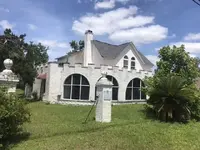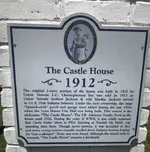Personally, I think it’s a bit weird to go knocking on the doors of residential properties unless you have some reason for believing that a search would be worthwhile. Something you’ve seen on an old map or evidence that something of historical interest once stood there for example. That would give you an angle for explaining why you’ve ‘targeted’ the property.
A property that clearly has more extensive land than a garden or yard is a different kettle of fish. Here’s my strategy, which in its entirety would be overkill in many cases for a short casual search, but I adapt it according to the circumstances and what the owner is comfortable with. I'm much more keen to search larger expanses of land and get repeat permission for multiple visits.
Always ask in person, not by phone, letter or e-mail and turn up at a convenient time. Around 9.00 am or 6.00pm at a weekend generally works for me in the UK – there’s usually someone home who can suggest a better time to call if the owner isn’t there. The first thing to be absolutely clear about is that the person you’re speaking to does actually own the property. Don’t expect to be invited straight away. For me that cold call is more usually a way of obtaining a future permission at a convenient time. Don’t disturb people who are working in fields or anything like that. Dress smart casual, no sunglasses (get eye contact), be neat and fresh-smelling. It’s good if you have a name (ask around or do a bit of research) so that you can properly address the person you are visiting.
Briefly introduce yourself and make it clear you are not selling anything. Make it known if you are a club or society member of any relevant kind. Stress that you are a hobbyist who does this for fun and because of your interest in history… not just because you’re looking for things of value that you can sell. Be clear that the fun of your hobby is as much about searching as it is about finding. You don’t know whether you’ll find anything or not, and won’t be disappointed if you don’t.
Take a small selection of interesting items with you and ask if the owner would like to see some things you’ve found at other locations. Spin a few yarns if they show any interest.
If other people in the vicinity have given you similar permission, make that known and offer the information in a way that could be construed as a reference and evidence of good character. Always ask if anyone who has given you permission in the past would be willing to “vouch for you” in future.
If you get permission for multiple visits, stress that you will not be searching at inconvenient times, making noise, bringing machinery on site or inviting others to join you (unless agreed). You will live with any restrictions or curfew the owner wants to stipulate and respect their privacy at all times. You will also not leave gates open, frighten livestock (and not bring a dog unless agreed), disturb wildlife, tread down crops, build fires or leave litter. I sometimes offer up that I will also remove litter and junk if I find it. You will also only do hand digging to investigate signals, fill in any holes afterwards and leave the area in a tidy, restored state.
Reassure the owner that you will discharge him from any liability for accidents or injury to yourself (except where there is negligence) and put this in writing. You will remain liable for damage to his property or injury to other persons. If you are a club member, they sometimes offer insurance specifically related to this (at least, they do in the UK). Otherwise you need to consider whether any existing insurance policies you have provide adequate protection. If you have cover, offer to show evidence of this.
Offer to show anything interesting you might find to the owner if they’d like to see. If you find a reasonable selection of items, you could offer to let the owner (or owner’s children) keep a couple of items. Stress again that you don’t intend to sell your finds but if anything particularly valuable and saleable (in the territory of “treasure”) does turn up you will split the proceeds with the owner (and commit to this in writing). I normally offer 50:50 and put a nominal “threshold” value on what constitutes “valuable”.
Whatever is agreed, put it in writing, be clear about the area covered (with a map or map reference if necessary), include some kind of time-frame and notice of cancellation, get it signed, get it dated and (preferably) get it witnessed. If the owner perceives a written agreement with discomfort, stress that it’s in their interests as well as yours. Here in the UK, metal-detector club websites have pro-forma agreements that can be downloaded and modified as appropriate.
If the answer’s “no”, accept that gracefully and without argument. Thank the owner anyway and leave your card in case they have a change of mind (print your own if you have to).
If the answer’s “yes”, always revisit the owner with a material token of your gratitude as well as a written thank you note at some appropriate point - whether you find anything or not. Something alcoholic or chocolatey does the trick.
As I said, this is going to be ‘overkill’ in many circumstances but you can cherry-pick the elements that are appropriate to the size and nature of the terrain concerned and how long you might be searching it.








